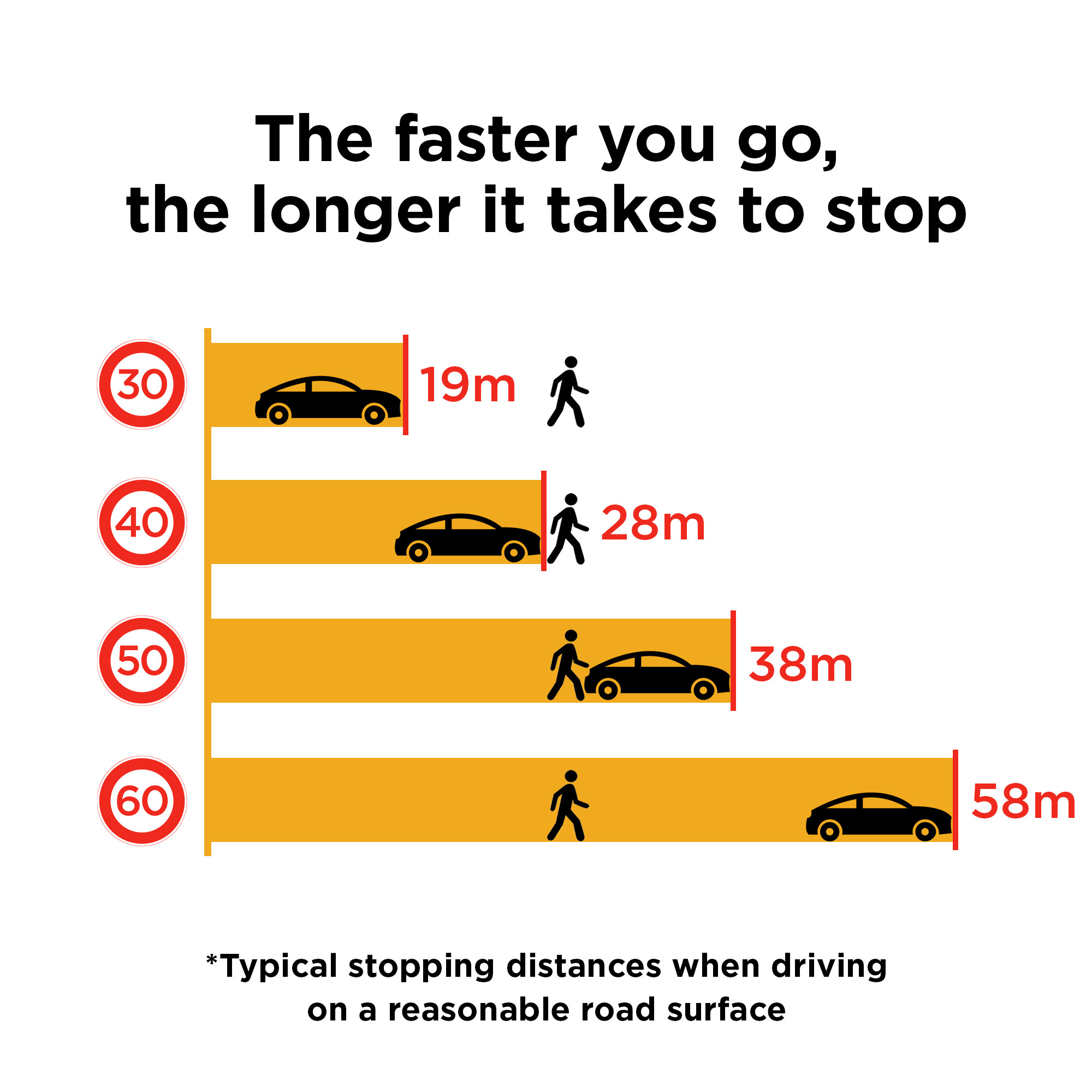
Pedestrians and Road Users
Road safety is everyone’s responsibility. To make our roads safer everyone needs to make safe decisions while on the road and sharing the road with other road users. All road users, no matter how they are travelling, should be able to arrive safely at their destination.
Pedestrian Safety
Data* shows that more than 1,500 pedestrians are hit on NSW roads each year with about 50 pedestrians killed and over 1,000 hospitalised. Pedestrians are particularly vulnerable and if hit by a car travelling at 50km/h are twice as likely to be fatally injured than if hit by a car at 40km/h. Even if you are familiar with the road, it’s vital to take an extra moment to look out before you step out, and always choose the safest place and time to cross the road.
When you’re driving or cycling, remember:
- Always give way to pedestrians
- Drive or ride at a speed that allows you to stop safely before pedestrian crossings
- Always obey ‘no stopping’ signs
- Never overtake or pass vehicles that are stopping or slowing down at crossings
- Always slow down to 40km/h when bus lights are flashing and watch out for pedestrians.
Pedestrian Safety Tips for drivers and cyclists:
- Take extra care when driving or riding through high pedestrian activity areas such as near shopping areas, public transport hubs and hospitals
- Be mindful that pedestrians with a disability and older pedestrians may need extra time to cross the road
- Remember that children can be difficult to see because they are smaller in size and may act unpredictably.
* Data sourced from Transport for NSW 2022, Centre for Road Safety website, NSW Government
Related Information from Transport for NSW Centre for Road Safety:
- Pedestrians - Staying Safe
- Pedestrian Crossings - Staying Safe
- Tips for pedestrians - Staying Safe
- Vulnerable Pedestrians - Staying Safe
- Children Pedestrians - Pedestrians - Staying Safe
- Motorised Wheelchairs - Pedestrians - Staying Safe
- Skateboards, Foot Scooters and Rollerblades - Pedestrians - Staying Safe
Speeding
 Speeding, fatigue and alcohol are the three main causes of death and injury on our roads.*
Speeding, fatigue and alcohol are the three main causes of death and injury on our roads.*
Driving too fast is the single biggest contributor to death and injury on NSW roads. In 2021, speed was a contributing factor to 25% of crashes in the Hawkesbury LGA.
* Data sourced from Transport for NSW 2021, Centre for Road Safety website, NSW Government
Related Information from Transport for NSW Centre for Road Safety:
Fatigue
Speeding, fatigue and alcohol are the three main causes of death and injury on our roads*.
Fatigue related crashes can happen on any trip, no matter the duration or time of day. It’s important to think about how tired you are before driving, recognise the early warning signs and know what to do to avoid driving tired.
In 2021 fatigue was a contributing factor to 4% of crashes in the Hawkesbury LGA
Before you drive: | If you feel tired when driving: |
|---|---|
|
|
* Data sourced from Transport for NSW 2020, Centre for Road Safety website, NSW Government
Related Information from Transport for NSW Centre for Road Safety:
Drink Driving
Speeding, fatigue and alcohol are the three main causes of death and injury on our roads*.
In 2020 alcohol was a contributing factor in 7% of all crashes in the Hawkesbury.
Alcohol
- Slows your brain
- Reduces your ability to judge how fast you are moving or your distance from objects
- Gives you a false sense of confidence
- Makes it harder to do more than one thing at a time
- Affects your sense of balance – a big risk if you ride a motorcycle
- Makes you drowsy
Blood Alcohol Limits (BAC) – Know Your Limit

Zero BAC applies to all:
- Learner drivers or riders
- Provisional 1 drivers or riders
- Provisional 2 drivers or riders
- Visiting drivers or riders holding an overseas or interstate learner, provisional or equivalent licence
If you are planning to drink, or are affected by alcohol or other drugs you need to have a Plan B to get home safely
* Data sourced from Transport for NSW 2022, Centre for Road Safety website, NSW Government
Related Information from Transport for NSW Centre for Road Safety
Motorcycle Safety
Motorcycle riders are more exposed and risk serious injuries if they are in a crash.
In 2021 motorcycle riders were the third highest percentage of casualties in the Hawkesbury LGA at 18. Male motorcycle rider casualties were involved in all of these incidents.
Transport for NSW Centre for Road Safety works closely with motorcycle riders and others to improve safety for motorcycle riders. Click here to find out more about these initiatives
Page ID: 216126
